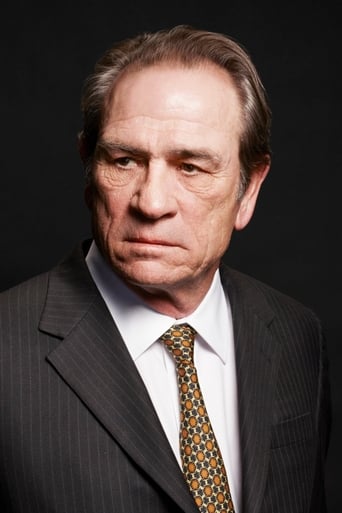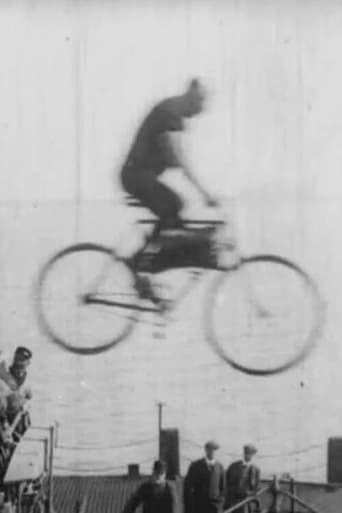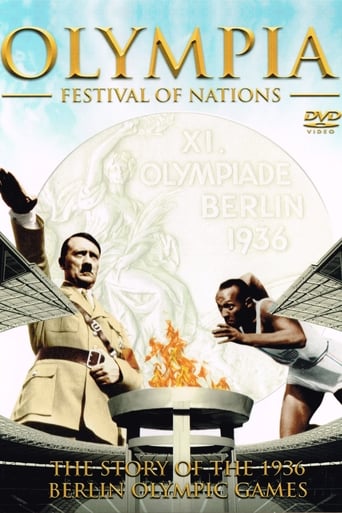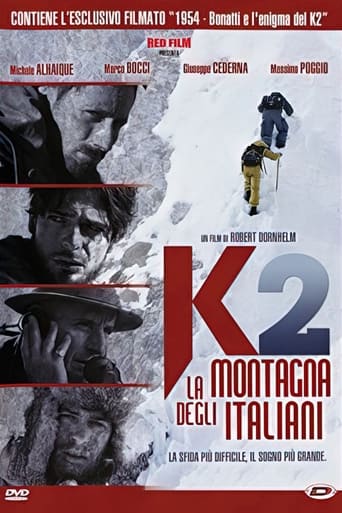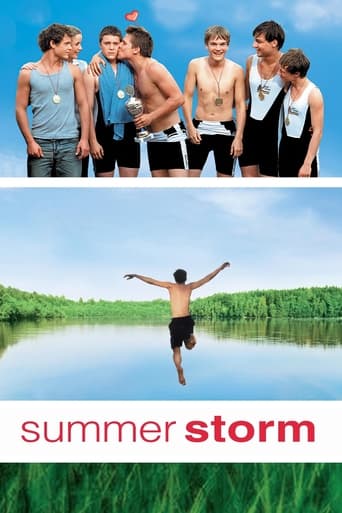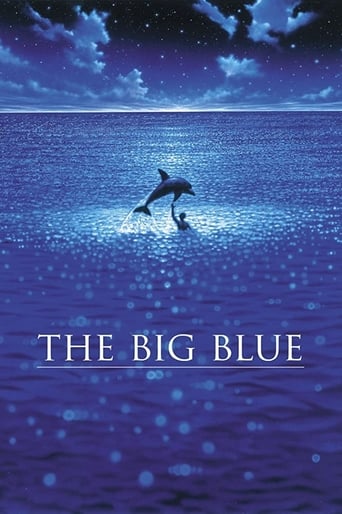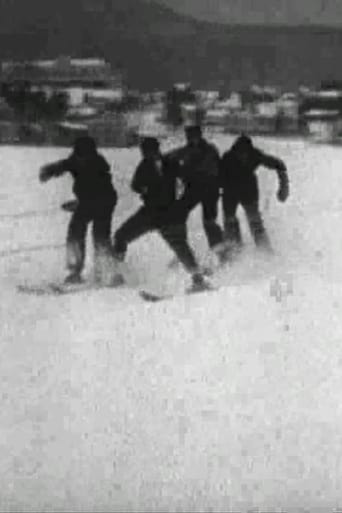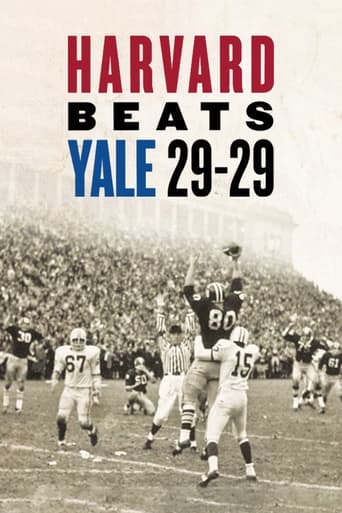

Harvard Beats Yale 29-29 (2008)
Filmmaker Kevin Rafferty takes viewers to 1968 to witness a legendary college football game and meet the people involved, interweaving actual gridiron footage with the players' own reflections. The names may be familiar (Tommy Lee Jones and friends of Al Gore and George W. Bush are among the interviewees), but their views on the game's place in the turbulent history of the 1960s college scene add an unexpected dimension.
Watch Trailer
Cast


Similar titles
Reviews
In the spectrum of potential audience size, Kevin Rafferty's moment by moment review of a 40+ year old Ivy League college football game must be close to the lowest end. Game footage from Harvard's television station accounts for somewhere between 3/5ths to 2/3rds of the documentary's run time with men in their late 50's talking about the game accounting for all of the remainder. Now it helps that one of these men was former Harvard offensive lineman and current movie legend Tommy Lee Jones who seems oddly somber and off put about having to discuss the game despite the fact that his team is Rocky Balboa to Yale's Apollo Creed. It also helps that some of the discussion involves future Presidents, Vice Presidents and other screen legends. Beyond the shine of celebrity, the proceedings also benefit from the darkness of war, specifically the Vietnam war and the coming together on a sports team of veterans of it with active protesters of it. However, women, residents outside the Northeast United States and those born after the Beatles broke up will struggle to find relevancy in this tale of an old football game. In short, see Rafferty's "Atomic Café" instead, an absorbing study of just how crazy the cold war got.
Watching Harvard Beats Yale 29-29 is like watching the greatest college football game you could ever imagine, and getting to know the players as it's happening. Even if you already know the final score, the process of getting there is spell-binding for anyone who enjoys watching sports (or has a pulse).But it's much more than just an amazing football game. Through interviews with the players - now older and wiser - the film evokes the background of the times - 1968, perhaps the most tumultuous year in modern American history.The players represented both sides of the political spectrum. Like other young people, many were war-protesters. Yet other players despised the protests - at least one was a proud Vietnam vet, who came to the Ivy Leagues after experiencing Khe Sanh.But on a cold November day, the players and the fans throughout New England put aside these political differences to celebrate the drama of The Game. Through the interviews, we learn that Yale was very heavily favored (thus a tie was considered a "win" for Harvard). We learn about the different personalities - which Yale players knew George W. Bush, which Harvard guy roomed with Al Gore, who dated Meryl Streep, who was the inspiration for the football-player character in Doonesbury, etc.But as the film progresses, these interviews slowly give way to a closer focus on the game itself. It's now late in the 4th quarter with the seconds ticking away. Harvard is still down by 16 points, and you are on the edge of your seat wondering how they are going to pull off this inspirational "victory", making everyone forget - at least for a brief moment - the darker battles then raging in America.
George Gipp and fiery halftime speeches do not figure in this film. Rather, what is fascinating about it is to hear a bunch of 60-somethings, Ivy League football players whose athletic careers mostly concluded on a Saturday afternoon in 1968, talk intelligently about what an exciting game with a story-book ending meant to them in the context of those times. The interviews are excellent, with an overlay of retrospection and introspection totally missing from post-game interviews on, say, Fox Sports today. The game footage that we see interspersed between those interviews -- undefeated Yale, ranked an unheard-of sixteenth in the country, played its traditional rival Harvard, also undefeated, in the final game of the season -- is interesting enough but not likely to hold the attention of non-sports fans. Of course, 1968 was a watershed year in a tumultuous decade, before "women were invented," as a Yale player puts it, so the game could not be played without accounting in some way for Viet Nam, student protests, ROTC on campus, political assassinations, class differences, sex, the fleeting nature of fame, and the necessity and unexpected results of growing up. Oddly enough, the words of Tommy Lee Jones, who played guard for the Harvard team and roomed with Al Gore, are among the least insightful. Producer, director, interviewer, and cinematographer Kevin Rafferty is a cousin of George W. Bush, but you would not know it from his film. There is something of the spirit of "The Fog of War" in this documentary which I greatly enjoyed. Full disclosure: I graduated from Harvard College in 1966, will never wax nostalgic about my years there, and remember Harvard football as a laughable excuse to enjoy autumn sunshine in New England.
Pegasus3 should change their name to "Clueless1". The title of this documentary QUOTES a headline on the Harvard Crimson after this game. If Pegasus3 found this a very boring documentary, that is their prerogative, but this isn't just about football, it's much more a peek into one of the most turbulent years in American and world history. Just look at 1968: the Vietnam War, the assassinations of Martin Luther King and Robert F. Kennedy, the Prague Spring and the Soviet invasion of Czechoslovakia, riots on college campuses, the protests by Tommie Smith & John Carlos at the Olympics in Mexico City, 1968 was a benchmark year for youth. Sure, the comments of the players are mostly about the game, but their insights into what else was happening at the time were great, such as the Yale player who was the roommate of George W. Bush telling that he had a picture of Bush hanging off the goalposts at Princeton(for which, we find out, Bush was arrested, and BTW, talk's cheap, let's see the picture!!), and another Yale player telling & showing us that he was dating Vassar co-ed Meryl Streep at this time. We find out that Tommy Lee Jones was the roommate of Bush's opponent, Al Gore. I remember hearing about this game after it occurred, but I never knew exactly what occurred, and though the title may say "Harvard Beats Yale", I love the fact that all the players feel like winners for experiencing it. Although I can't see how something called J. Hoberman of the Village Voice could mention a piece of junk like either version of "The Longest Yard" in the same paragraph with this great little film. Of course, Hoberman is from New York, and I don't think they've played college football in New York since back before Columbia lost 29 games in a row. I love college football. I lived through 1968. I loved "Harvard Beats Yale 29-29".


